8 Advantages And 8 Disadvantages Of Letting Your Dog Sleep In Bed With You
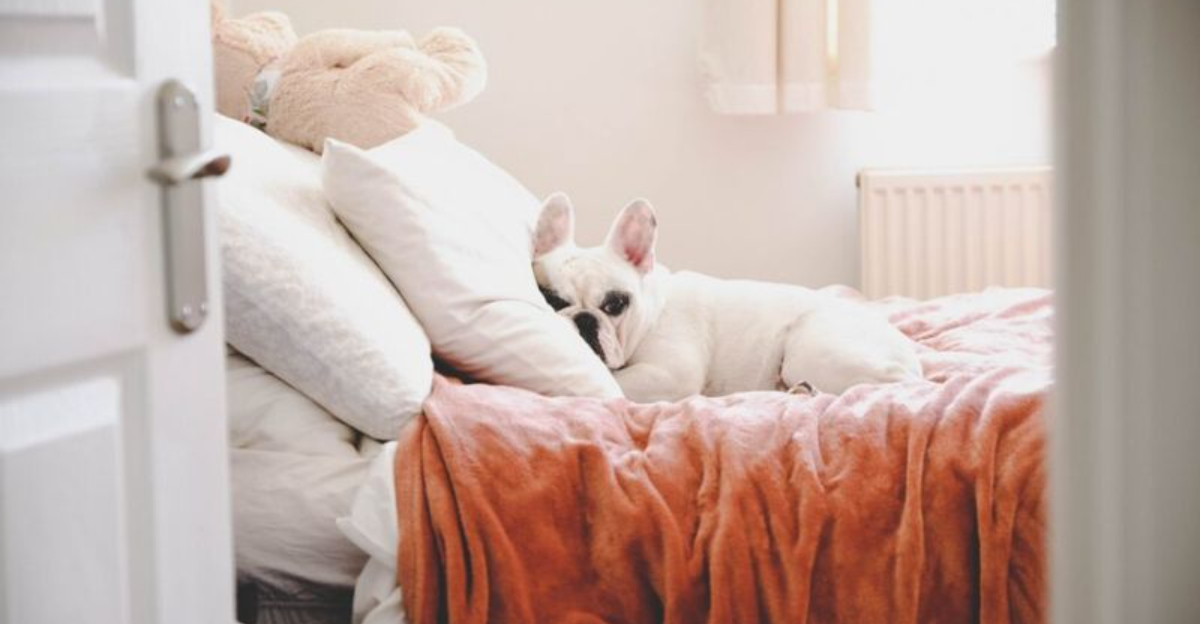
Ever wondered if those puppy eyes begging to hop on your mattress deserve a nightly spot next to your pillow?
Nearly half of all dog owners let their furry friends share their sleeping space. This age-old debate has passionate advocates on both sides, with compelling reasons that might make you reconsider your current sleeping arrangement.
1. Warmth On Chilly Nights
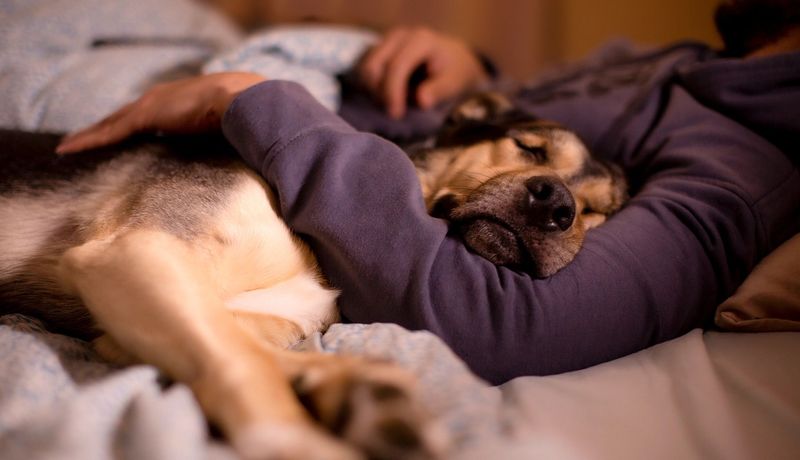
Your pup’s toasty 102°F body temperature creates a natural heating pad effect during those cold winter nights. Their furry presence can help lower your heating bills while keeping you snug.
Many dog owners report falling asleep faster when cuddled up with their warm canine companions. The gentle heat radiating from your dog’s body creates a cozy microclimate under the covers.
2. Stress-Busting Cuddles

Physical contact with your dog triggers oxytocin release – the same hormone that bonds mothers to babies. This chemical cascade can lower your blood pressure and ease anxiety almost instantly.
Many therapists actually recommend this nighttime bonding as a natural treatment for mild insomnia and everyday stress.
3. Enhanced Sense Of Security

Your dog’s keen senses act like a built-in security system while you sleep. Their alert ears can detect unusual sounds long before you would notice anything amiss.
Even breeds not known for guarding instincts tend to bark at potential threats, giving you precious warning time. This natural alarm system often helps people sleep more soundly.
4. Deeper Emotional Bonds

Bedtime routines create powerful shared experiences that strengthen your connection. Your dog views this invitation to your most vulnerable space as the ultimate sign of trust and pack acceptance.
Many canine experts note that dogs who sleep with their humans often show increased loyalty and responsiveness to commands. This nightly ritual establishes you as their trusted leader while reinforcing your special place in their pack hierarchy.
5. Mood-Boosting Morning Greetings

Waking up to a tail-wagging bundle of joy beats any alarm clock! That enthusiastic good morning face can set a positive tone for your entire day.
Dog owners report fewer morning blues compared to non-pet owners. Something about those excited wiggles and happy doggy smiles makes even Monday mornings more bearable.
6. Help For Certain Health Conditions

For people with specific medical concerns, a dog’s presence can be therapeutic. Those with PTSD often experience fewer nightmares when their dogs sleep nearby, providing immediate comfort during episodes.
Seizure-alert dogs can detect oncoming episodes during sleep, potentially saving lives. Even for those without serious conditions, the rhythmic sound of doggy breathing creates a natural white noise that many find deeply relaxing.
7. Consistency For Your Canine

Allowing bed-sharing creates a stable sleeping arrangement that prevents confusion about where they should rest each night. This consistency particularly benefits rescue dogs with past trauma or anxiety issues.
Knowing exactly where they’ll sleep reduces their stress levels significantly. Many behaviorists note that this security helps prevent destructive behaviors that stem from separation anxiety.
8. Natural Sleep Cycle Alignment

Surprisingly, dogs and humans share similar sleep patterns. Both species cycle through REM and non-REM sleep, often synchronizing these cycles when sharing a bed.
This natural alignment can actually improve sleep quality for both of you. Many owners report their dogs settle down when they do and become active when they naturally wake.
9. Disrupted Sleep From Movement
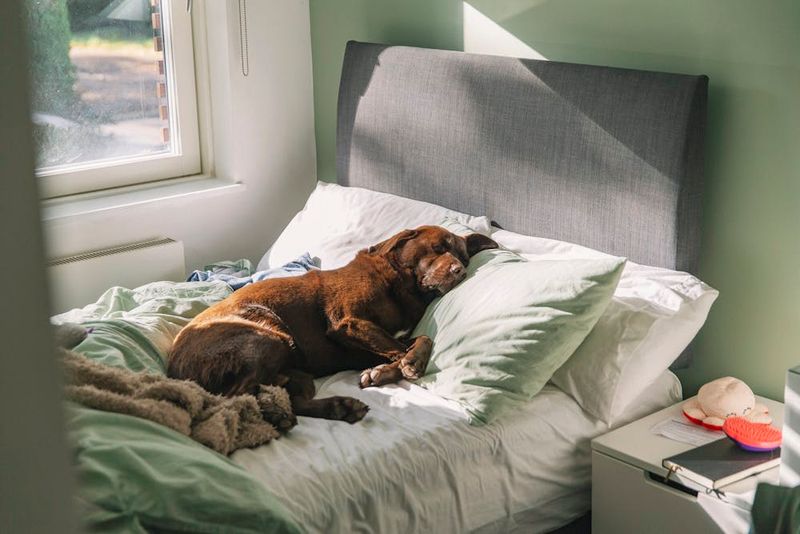
Even the most peaceful pup repositions throughout the night. Those midnight stretches, dream twitches, and comfort adjustments can repeatedly interrupt your precious deep sleep phases.
Studies show dog owners experience 30% more sleep disturbances than those who sleep solo. Light sleepers particularly suffer, as even subtle movements can trigger wakefulness.
10. Allergy Aggravation
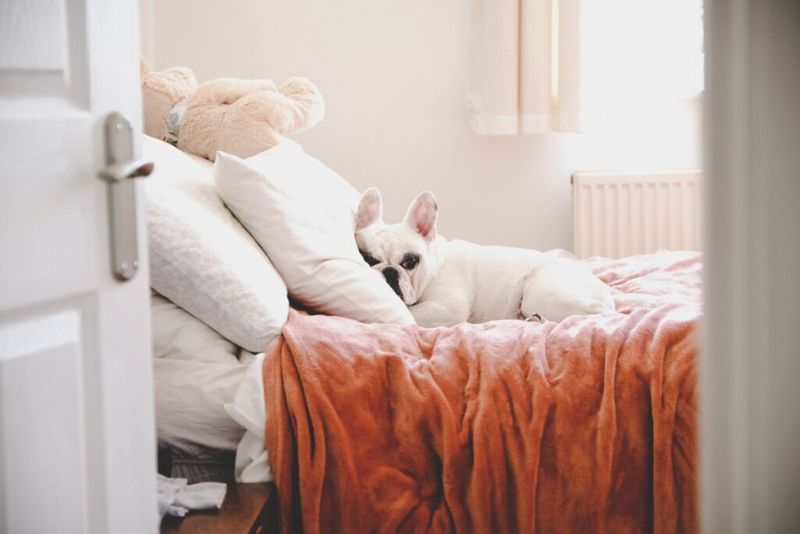
Your bed becomes a reservoir for dander, fur, and outdoor allergens when shared with your four-legged friend. These particles get trapped in sheets and mattresses, creating a nightly allergy exposure that’s hard to escape.
Even mildly allergic people often experience worsened symptoms with this extended contact. Morning congestion, itchy eyes, and sinus pressure become common complaints.
11. Hygiene Concerns

Paws that walk outside bring in dirt, bacteria, and sometimes parasites straight to your sheets. Even meticulously groomed dogs carry microorganisms that humans normally wouldn’t encounter in bed.
Muddy adventures and park playtimes leave invisible traces. Veterinarians point out that dogs can transmit certain zoonotic conditions through close contact.
12. Territorial Behavior Development

Giving your dog bed privileges can accidentally encourage resource guarding. Some pups begin viewing your mattress as their territory, potentially growling at other pets or even your partner who approaches “their” space.
This territorial response develops gradually and often surprises owners. Behaviorists warn that this problem becomes particularly pronounced in certain breeds with stronger protective instincts.
13. Potential Relationship Strain

When Fido claims the middle spot, romantic partners can feel literally and figuratively pushed aside. This furry wedge creates surprising tension in many relationships.
Surveys reveal that nearly 30% of couples report arguments about dogs in bed. The issue goes beyond physical space – different opinions about appropriate pet boundaries reflect deeper relationship dynamics.
14. Reinforced Separation Anxiety

Constant nighttime togetherness can intensify your dog’s attachment issues. When you must travel or your routine changes, dogs accustomed to bed-sharing often experience heightened distress.
Trainers observe that these dogs typically struggle more with being left alone during daytime hours too. The 24/7 contact creates dependency rather than confidence.
15. Compromised Training Boundaries
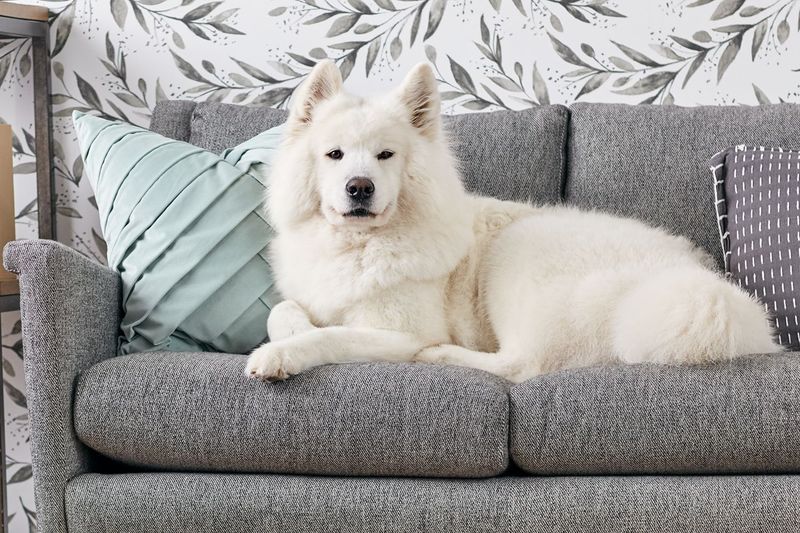
Allowing bed access blurs the line between permitted and restricted spaces in your home. Dogs struggle to understand why the couch or dining table remains off-limits when the bed is fair game.
This inconsistency confuses even the smartest pooches. Training experts note that clear, consistent boundaries create more balanced canine behavior overall.
16. Delayed Potty Training Progress

Puppies and newly adopted dogs might struggle distinguishing between appropriate elimination spots when given full bed access. The warm, absorbent qualities of bedding unfortunately resemble their puppy pads.
Nighttime accidents become more common when young dogs sleep in your bed before fully grasping house training concepts. Many trainers recommend waiting until a dog demonstrates 30 consecutive accident-free days before bed privileges.






